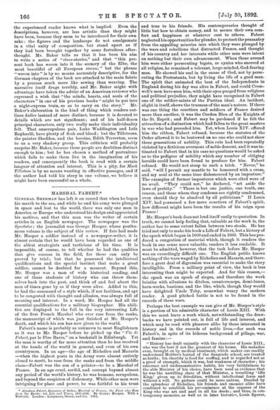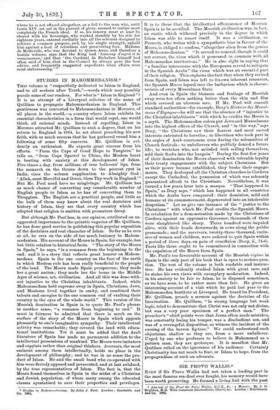MARSHAL FABERT.*
GENERAL SHERhiAN has left it on record that when he began his march to the sea, and while he and his army were plunged in space and lost to the world, there was only one man in America or Europe who understood his design and appreciated his motives, and that this man was the writer of certain articles in an English newspaper. The newspaper was the Spectator; the journalist was George Hooper, whose posthu- mous volume is the subject of this review. If fate had made Mr. Hooper a soldier instead of a newspaper-writer, it is almost certain that he would have been regarded as one of the ablest strategists and tacticians of his time. It is impossible, of course, to tell whether he had the qualities that give success in the field, for these can only be proved by trial ; but that he possessed the intellectual qualifications and the special instinct that make a great soldier, cannot be doubted for a moment. Beyond this, Mr. Hooper was a man of wide historical reading, and one of those students of history who can throw them- selves back into the past, and think of and feel about the men of times gone by as if they were alive. Added to this, he had the command of a style which, if not faultless, and apt to be congested with thought and allusion, was always full of meaning and interest. In a word, Mr. Hooper had all the essential qualifications for a military biographer. His abili- ties are displayed to the full in the very interesting Life of the first French Marshal who ever rose from the ranks, the manuscript of which was just finished at Mr. Hooper's death, and which his son has now given to the world.
Fabert's name is probably as unknown to most Englishmen as it was to Mr. Hooper before he picked up the "Vie de Fabert, par le Pere Barre," on a bookstall in Edinburgh. Yet the man is worthy of far more attention than he has received at the hands of the world in general, and even of his own countrymen. In an age—the age of Richelieu and Mazarin —when the highest posts in the Army were almost entirely closed to merit, he rose from the ranks and from the middle class—Fabert was the son of a printer—to be a Marshal of France. In an age cruel, sordid, and corrupt beyond almost any period of the world's history, he was humane, scrupulous, and beyond the suspicion of dishonesty. While other men were intriguing for place and power, he was faithful to his trust • Abraham Fabert, Governor of Sedan, Marshal of France, the Pisa who Rose from the Ranks: hie Life and Times, 1899480. By George Hooper. With a Portrait. London : Longmans, Green, and Co. 1891..
and true to his friends. His contemporaries thought of little but how to obtain money, and to secure their own com- fort and happiness at whatever cost to others. Fabert neglected his opportunities for plunder, to protect the peasantry from the appalling miseries into which they were plunged by the wars and rebellions that distracted France, and thought of his country and her interests while other men were intent on nothing but their own advancement. When those around him were either persecuting bigots, or cynics who sneered at all religion, he remained a tolerant, large-minded, God-fearing man. He showed his zeal in the cause of God, not by perse- cuting the Protestants, but by living the life of a good man.
The spirit that animated the best of the Independents in England daring his day was alive in Fabert, and could Crom- well's men have seen him, with their eyes purged from religions and political prejudice, they might have recognised in Fabert one of the soldier-saints of the Puritan ideal. An incident, slight in itself, shows the trueness of the man's nature. If there was one thing the courtiers and soldiers of France desired more than another, it was the Cordon Bleu of the Knights of the St. Esprit ; and Fabert may be pardoned if he felt the attraction of a distinction which had fallen to the great masters in war who had preceded him. Yet, when Louis XIV. offered him the ribbon, Fabert refused, because the statutes of the Order allowed it to be bestowed on no one who could not show three generations of nobility. This rule had been repeatedly violated by a fictitious averment of noble descent, and it was in- timated to Fabert that in his case no questions would be asked as to the pedigree of nobility which any number of obliging heralds could have been found to produce for him. Fabert refused. He would not stoop to such a trick. "Never," he said, "will I permit my mantle to be honoured with a cross, and my soul at the same time dishonoured by an imposture."
The examples of former impostures which were cited were of no avail. "They could not," he declared, "set aside the laws of probity." "There is but one justice, one truth, one reason, and those whom they condemn are rightly condemned, even should they be absolved by all politicians." If Louis XIV. had possessed a few more courtiers of Fabert's spirit, how different might have been the results of his reign upon France !
Mr. Hooper's book does not lend itself easily to quotation. In truth, we cannot help feeling that, valuable as the work is, the author has to some extent fallen between two stools. He has tried not only to make his book a Life of Fabert, but a history of the epoch which began in 1600 and ended in 1660. This has pro- duced a congestion of material which, though it renders the book in one sense more valuable, renders it less readable. It must be admitted, however, that the task before Mr. Hooper was an exceedingly difficult one. The English public knows nothing of the wars waged by Richelieu and Mazarin, and there- fore a great deal of digression was essential to make the story intelligible. From a military point of view, the book is less interesting than might be expected. And for this reason,— the epoch was an epoch of sieges, and therefore the work bristles with allusions to ditches, connterscarps, demi-lunes, horn-works, bastions, and the like, which, though they would have delighted Uncle Toby, somewhat weary the modem reader. A good pitched battle is not to be found in the records of these wars.
Perhaps the best example we can give of Mr. Hooper's style is a portion of his admirable character of Louis XIII. With this we must leave a work which, notwithstanding the draw- backs we have pointed out, is full of life and interest, and which may be read with pleasure alike by those interested in history and in the records of noble lives,—for such was Fabert's, in spite of its hideous background of pillage, war, and famine :—
" History has dealt unjustly with the character of Louis XIII., who was the best if not the greatest of his house. His maladies even, brought on by medical treatment, which makes one readily understand Moliere's hatred of the Sangrado school, are treated as faults ; his chastity is food for scoffing, and is regarded not as a proof of strength, which it was, but weakness of character ; his reticence and undemonstrative habits, his very faithfulness to the able Minister of his choice, have been used as evidence that he was the unwilling slave of that Minister, a trembling 'idle King,' given up to frivolities, without intellectual force and without a will. No picture could be more untrue. Dazzled by the splendour of Richelieu, his friends and enemies alike have combined to establish his pre-eminence at the expense of the King who was art and part in all his deeds ; and thus, in con- temporary memoirs, as well as in later histories, Louis figures,
where he is not effaced altogether, as a foil to the man who, until Louis XIV. set out in the pursuit of glory, seemed to realise most completely the French ideal. If so, his renown must at least be shared with his Sovereign, who worked steadily by his side for eighteen years, entered cordially into all the schemes designed to achieve a common purpose, and, by his single strength, upheld him against a host of relentless and persevering foes. Madame de Motteville, who was devoted to Queen Anne, and therefore a hostile witness, says that the King had beaucoup d'esprit et de connoissances,' and that the Cardinal de Richelieu himself had often said of him, that in the Council he always gave the best advice, and frequently suggested expedients when affairs were most embarrassing."



































 Previous page
Previous page